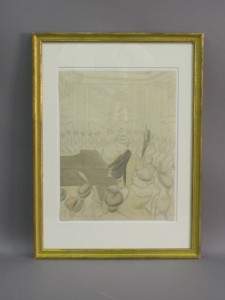“‘And yet,’ demanded Councillor Barlow, ‘what’s he done? Has he ever done a day’s work in his life? What great cause is he identified with?’
“‘He’s identified,’ said the speaker, ‘with the great cause of cheering us all up.'”
Arnold Bennett, The Card

 I hung a caricature by Max Beerbohm on my living-room wall late yesterday afternoon–and thereby hangs a tale.
I hung a caricature by Max Beerbohm on my living-room wall late yesterday afternoon–and thereby hangs a tale.